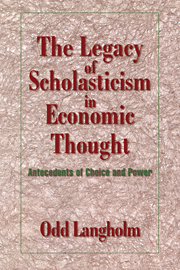Book contents
- Frontmatter
- Contents
- Preface
- Introduction
- I COMPULSION AND THE WILL: THREE ANCIENT TRADITIONS
- II NEED AS COMPULSION: THE SCHOLASTIC PARADIGM
- 4 Loans and usury
- 5 Price and market manipulation
- 6 Need and the will in buying and selling
- 7 Labor and wages
- III REJECTION AND REVIVAL IN POSTSCHOLASTIC THOUGHT
- Bibliography
- Index
6 - Need and the will in buying and selling
Published online by Cambridge University Press: 13 March 2010
- Frontmatter
- Contents
- Preface
- Introduction
- I COMPULSION AND THE WILL: THREE ANCIENT TRADITIONS
- II NEED AS COMPULSION: THE SCHOLASTIC PARADIGM
- 4 Loans and usury
- 5 Price and market manipulation
- 6 Need and the will in buying and selling
- 7 Labor and wages
- III REJECTION AND REVIVAL IN POSTSCHOLASTIC THOUGHT
- Bibliography
- Index
Summary
The principle of mutual benefit
In scholastic terminology, for instance as quoted from Alexander of Hales in section 5.4, the traditions on speculation, price discrimination, collusion, and monopoly can be viewed as elaborations of the circumstances under which commerce is morally blameworthy. It is true that Alexander lists circumstantia consortii as a separate item, but the various forms of market manipulation may equally well be related, either to circumstantia modi or to circumstantia causae. That is, they can be seen as unacceptable modes of doing business, or, as frequently pointed out by the authors themselves, they may be expected to have been inspired by morally suspect motivations. By the same token, conformity with a current market-price estimate may serve as a guarantee that these circumstances are absent. These criteria, however, are not easily applicable. When buyer and seller do not actually meet in a competitive market (which would have made the market criterion redundant), the just market price is a most elusive quantity. Moreover, there are all kinds of markets in all kinds of states, and market manipulation is a relative concept. Some scholastics, in all earnestness, recommended that the government fix prices of all necessaries. To leave them to the decision of the parties themselves, said Henry of Hesse, is to loosen the rein on cupidity, which excites almost all sellers to a quest for excessive gain. Comprehensive price regulation, however, was not a practicable policy. Introducing the exchange model in Ethics, V, Albert the Great revived a distinction suggested by Cicero.
- Type
- Chapter
- Information
- The Legacy of Scholasticism in Economic ThoughtAntecedents of Choice and Power, pp. 100 - 117Publisher: Cambridge University PressPrint publication year: 1998



